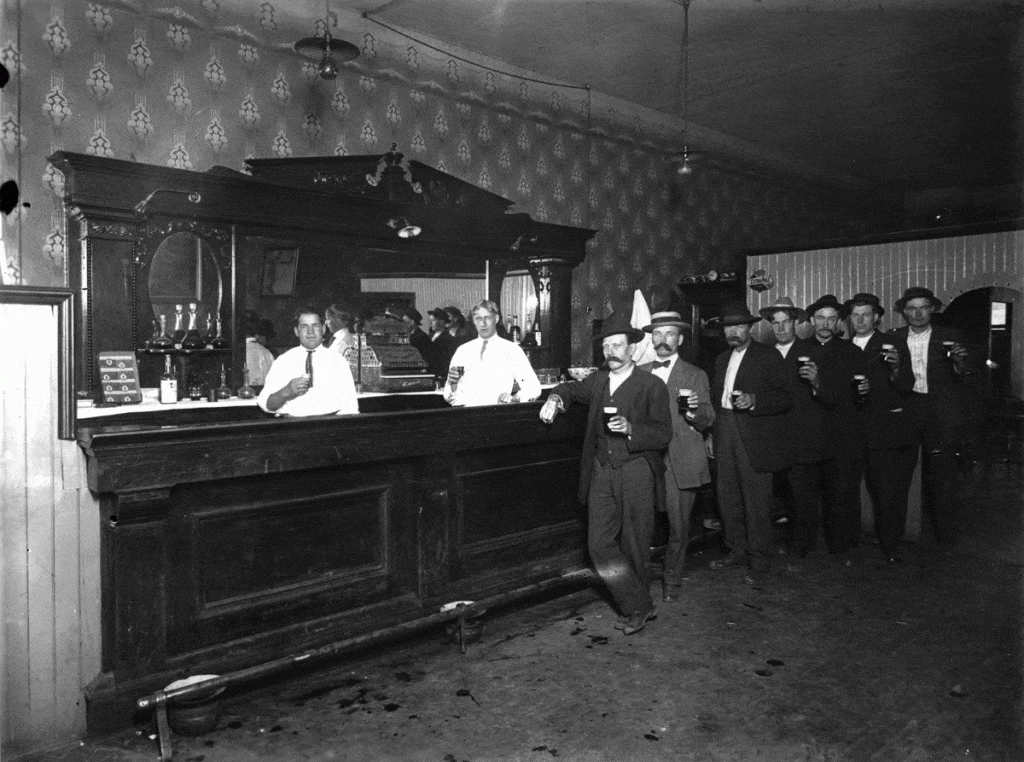This is the first article in a series on Prohibition in Park City.
Nationwide Prohibition was ratified as the 18th Amendment to the U.S. Constitution on January 16, 1919. The Volstead Act, passed October 28 of the same year, further defined prohibition and the alcohols banned under the amendment. But before all of that, Utah had already enacted a less strict version of Prohibition on August 1, 1917.
Park City, with all of its saloons, was to be one of the areas hardest hit in the state in terms of businesses closing and patrons having to find something else. Sam Raddon, editor of the Park Record, spoke for the paper, endorsing Prohibition. Five months before the Utah prohibition bill was expected to pass, he wrote “If it becomes law in its present form, and the law is enforced, Utah will be as “dry” as the proverbial bone…. It is a prohibition measure that will surely prohibit – and that is what we want.”[1]
With Prohibition on the way, owners of some of the saloons began to alter their businesses or close down. Henry Spriggs, who had kept a version of his saloon open after the Great Fire of 1898, was changing the upper floor of his saloon into a rooming house and the downstairs into a pool hall. According to the Park Record, “Spriggs is one of the many liquor men who will welcome prohibition.”[2] William Donovan was the first to close a saloon due to the impending law.[3]
Raddon was not shy about his views on Prohibition, writing articles and editorials praising its virtues and potential for, in his view, a better society. A couple of months before the Utah prohibition bill passed, he “unhesitantly predict[ed] that once prohibition is established in Utah, stronger will be the “dry” sentiment as the months and years roll by.”[4]
Before that sentiment could theoretically begin to take hold, however, those who drank spirits were expected to have one last “grand finale” on the eve of the bill becoming law.[5] Indeed, patrons created a mass bar crawl on July 31, 1917 in Park City. Parkite J.W. Popenoe, a boy at the time, said in an oral history that the whole town was drunk, adding “What would happen if right now they said, ‘you ain’t going to have any more whiskey tomorrow’? You know you’d try to drink it up tonight.”[6]

Park City Historical Society & Museum, Carrie Vivian Hodgson Collection
The Park Record reported that “when City sexton W.A. Gidley tolled the bell at midnight on Tuesday, thus proclaiming to the populace that king booze was dethroned and dead, a wild scene was being enacted on Main Street, and empty barrels and empty ice cream freezers and everything else that would roll down the paved street were set in motion amid drunken yells and loud hurrahs by the midnight revelers – and the celebration kept up until the effects of the last drink wore off and saneness returned….”[7]
They continued “one by one the saloons closed the doors because of being completely sold out, and the last two hours of ‘wetdom’ practically only one saloon was supplied with the exhilarating liquids so much sought. This was the Gold Label and proprietor W.J. Kappas and six or eight bartenders could not begin to satisfy the cravings of the drink-seekers. During the rush, those who could not be waited on helped themselves, and bottled goods, no matter what the contents, were stolen and broken and emptied, and boisterous hilarity prevailed until the grave digger’s bell, tolled by the happy grave digger himself, warned the liquor sellers that the much talked of and long desired statewide prohibition law was in operation. The saloons were emptied, the doors locked, and prohibition commenced.”
Stay tuned for next week, as Park City adjusts (or doesn’t) to Prohibition.
The Park City Museum will host a Zoom lecture by author and historian Garrett Peck titled “Prohibition: Thirteen Awful Years of the Noble Experiment” on Wednesday, May 4 from 5-6 p.m. Register here.
[1] “Only Five Months More.” Park Record, January 12, 1917.
[2] “News About Town” Park Record, February 23, 1917.
[3] “Park Float.” Park Record, July 6, 1917.
[4] “General Items.” Park Record, June 8, 1917.
[5] “Park Float.” Park Record, July 6, 1917.
[6] Hampshire, David. J.W. Popenoe Oral History, June 1990. Page 9. Park City Museum Oral History Collection.
[7] “A Wild Night.” Park Record, August 3, 1917.